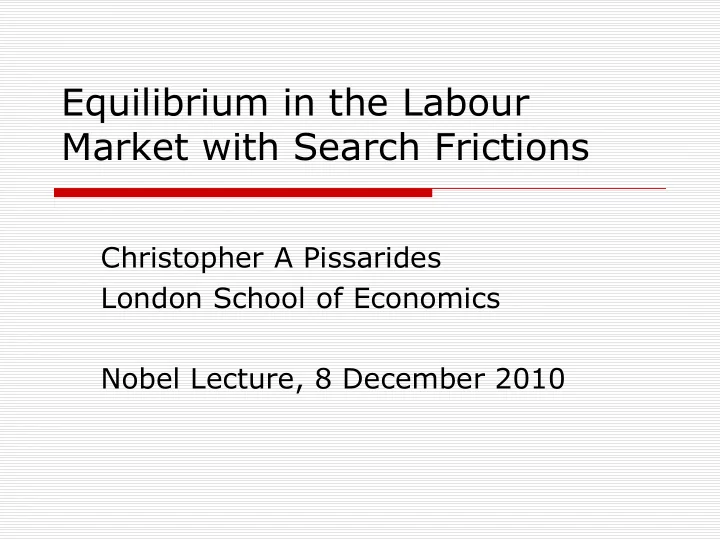

Equilibrium in the Labour Market with Search Frictions Christopher A Pissarides London School of Economics Nobel Lecture, 8 December 2010
Theory How I got into search theory Searching for what? Search for a high wage Two-sided search for a good match The matching function
Theory Towards an equilibrium model Wage bargains Job creation Beveridge curve equilibrium
The Beveridge curve and equilibrium vacancies and unemployment vacancies Job creation Beveridge curve θ unemployment
Application 1 Comparing economies over space and time
Comparing economies Beveridge curves vacancies Job creation lines Economy with more v frictions θ Economy with lower u unemployment level of aggregate activity
Figure 4 The British Beveridge curve, 1975-1984 (an economy with more frictions) 1.20 1.00 79 0.80 78 vacancies % 84 77 83 75 80 82 0.60 76 81 0.40 0.20 0.00 0.00 2.00 4.00 6.00 8.00 10.00 12.00 14.00 unemployment %
Figure 5 The British Beveridge curve, 2008-2010 (an economy with lower level of aggregate activity) 2.9 2008M1 2.7 2.5 vacancies 2.3 2.1 1.9 2010M 1.7 2009M4 1.5 4.0 4.5 5.0 5.5 6.0 6.5 7.0 7.5 8.0 8.5 unemployment
Figure 6 The US Beveridge Curve, 1975-1984 (an economy driven by aggregate economic activity) 5.5 79 5 78 80 4.5 81 84 77 4 vacancies 76 75 3.5 83 82 3 2.5 2 1.5 4 4.5 5 5.5 6 6.5 7 7.5 8 8.5 9 9.5 10 10.5 unemployment
Figure 7 The US Beveridge curve, 2008-2010 (an economy with lower level of aggregate activity, followed by jobless recovery with frictions?) 3.1 2.9 2008M1 2.7 2.5 vacancies 2.3 2010M10 2.1 1.9 2009M4 1.7 1.5 4.0 5.0 6.0 7.0 8.0 9.0 10.0 11.0 unemployment
More applications Wage stickiness Job destruction Employment protection legislation
Figure 9 Job creation and job destruction rates, US non-farm sector 25.0 per cent of employment (annual) 20.0 15.0 10.0 5.0 0.0 1977 1979 1981 1983 1985 1987 1989 1991 1993 1995 1997 1999 2001 2003 2005 JCR JDR
Where do we go next? Role of institutions Theory of wages: how much wage stickiness and why? Imperfect capital markets Imperfect knowledge and expectations Integration of financial and labour markets
Recommend
More recommend